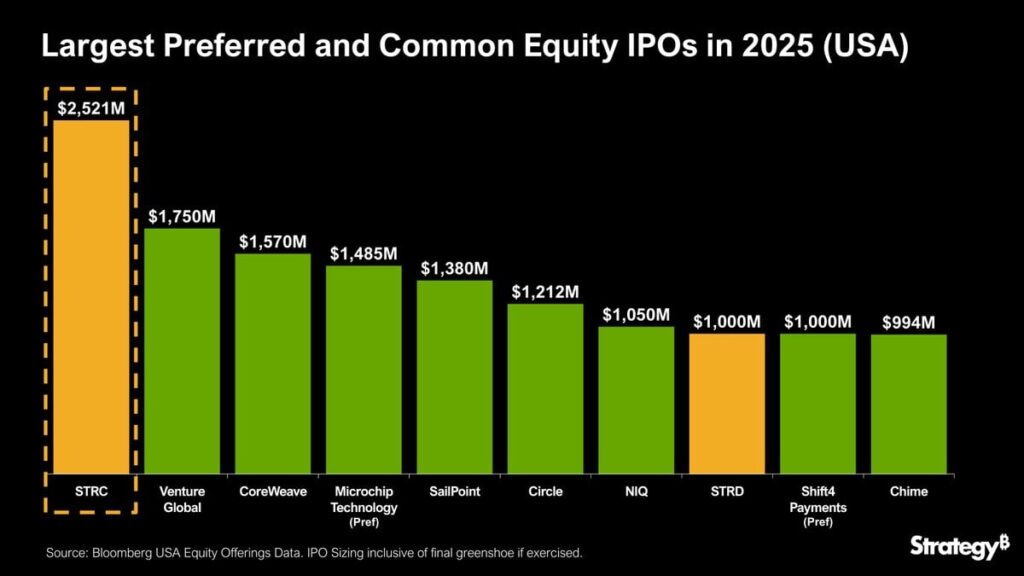Bitcoin Treasury Strategy: No Recent Purchases and Large IPO Plans
In the latest update from Strategy, the well-known Bitcoin treasury company has revealed that it made no Bitcoin purchases in the week ending July 27. As a result, its total holdings remain steady at 607,770 BTC. The company’s aggregate purchase price stands at an impressive $43.61 billion, which translates to an average purchase price of approximately $71,756 per Bitcoin, inclusive of associated fees and expenses. This data was reported in a Form 8-K submitted to the U.S. Securities and Exchange Commission (SEC) on July 29, providing transparency about its activities in the cryptocurrency market.
Active Market Strategies
Throughout the period from July 21 to July 27, Strategy also reported no sales under any of its active at-the-market programs. This decision has left a substantial capacity in various equity facilities, totaling $17.04 billion on the common stock ATM. Additionally, noteworthy amounts remain available in specific perpetual facilities: $20.45 billion on the STRK (8.00% Series A Perpetual Strike), $1.88 billion on the STRF (10.00% Series A Perpetual Strife), and $4.18 billion on the STRD (10.00% Series A Perpetual Stride). This retention of capital indicates a strategic pause rather than a retreat, as the company prepares for potential future acquisitions.
The Largest U.S. IPO of 2025
Intriguingly, Strategy’s recent activities coincide with its plans to initiate a considerable securities offering. The company has priced its Variable-Rate Series A Perpetual Stretch preferred stock at $90 per share, offering a total of 28,011,111 shares for sale. This move is expected to raise over $2.5 billion, with the scheduled settlement anticipated for July 29. Proceeds from this offering aim to not only enable further Bitcoin acquisitions but also support general corporate purposes. With this development, Strategy is positioning itself to become a key player in the financial landscape, aiming to secure its status as the largest U.S. IPO of 2025.
Equity-to-Bitcoin Flywheel Effect
Despite some criticisms, Strategy appears to embrace a model that utilizes capital raised from equity to enhance its Bitcoin holdings. This approach has drawn scrutiny from various quarters as seen by skeptics who worry about the sustainability of this "bubble." Yet, experts from TD Cowen argue that the strategy is grounded in sound financial principles. They maintain that Strategy’s net asset value premium is justified, due to its proven ability to convert that premium into substantial Bitcoin acquisitions. This dynamic has created a compelling "equity-to-Bitcoin flywheel," pushing the number of Bitcoin per share upward significantly over the past 18 months. The potential for continued growth remains as long as access to capital markets remains viable.
A Bellwether for Corporate Crypto Reserves
As the largest publicly listed holder of Bitcoin, Strategy serves as a significant barometer for the broader trend of corporate crypto reserves. Strategy stands out in an increasingly crowded field, with around 160 public companies currently having disclosed Bitcoin holdings. This group, including recognizable names such as Marathon Digital Holdings (MARA) and Metaplanet, collectively holds over 752,990 BTC, representing almost 4% of Bitcoin’s total supply of 21 million. The increasing interest from publicly traded companies highlights a growing acceptance of digital currencies as a legitimate asset class.
Conclusion and Future Implications
In summary, Strategy’s decision to hold steady on its Bitcoin acquisitions while preparing for a substantial IPO offers valuable insights into its long-term strategy. By leveraging equity to bolster its BTC holdings, the company aims to create sustained value for its shareholders. The potential for continued expansion, combined with the company’s status as a leader in corporate Bitcoin adoption, position Strategy as a key player in the evolving cryptocurrency landscape. Going forward, as more public companies continue to disclose Bitcoin balances, the implications for the cryptocurrency market and the global financial system will be substantial, indicating an enduring trend towards digital asset incorporation in traditional financial frameworks.
















